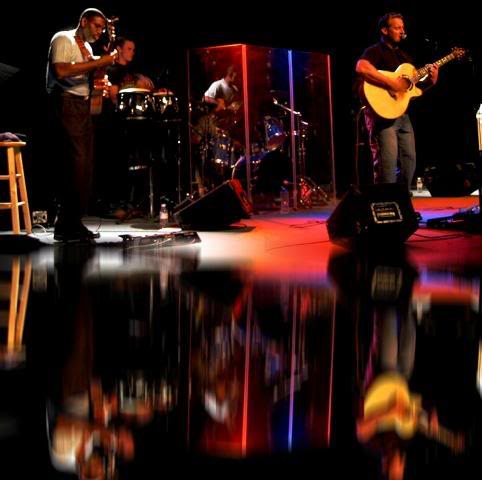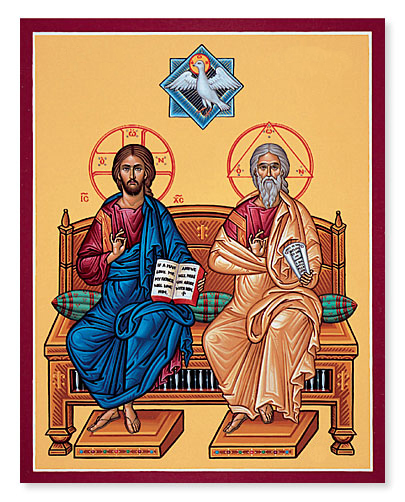Supernaturally Natural: Rethink The Way We, The Church, Worships Corporately – Part XV
from Supernaturally Natural: Chapter 15 manuscript by Anthony Bachman
 Mindset to rethink: The arts are for art galleries because most art is so worldly.
Mindset to rethink: The arts are for art galleries because most art is so worldly.
Only the Sistine Chapel in Rome houses qualified “religious” art. Anyhow, where does art fit into our natural order of worship? “Don’t you know that the National Endowment for the Arts is an end times satanic instrument of perversion, lewdness, and immorality,” so many churches profess.
Some of the greatest art that exists was done for the Church, yet the Church has lost touch with the power of the arts over the last century. I grew up in the plain Anabaptist tradition that frowned upon even having musical instruments in the Church. Forget about a positive mindset toward the arts. “Meeting Houses” were plain, and the only artwork that I remember seeing in the church as a kid was the picture of Jesus as if he just shampooed and blow-dried his hair producing a glow. Quilts could be colorful, creative, and sold at auction, but nothing as colorful as they in the church building.
I feel the Holy Spirit is supernaturally bringing the arts back into worship. It is a chance to give back to the Creator the creative talents He has given you. “I AM your creator.”
 Fictional Writing: For the longest time, Christian publishers shunned really creative work in place of testimony books, Bible study books, and inspirational type literature. I was thrilled when I read Frank Paretti’s “Piercing the Darkness” or C.S. Lewis’ “Chronicles of Narnia”, or “Screw Tape Letters”, “The Great Divorce”, or his Science Fiction trilogy. All of these works expose the supernatural in a very natural way that only fiction can do. We are not usually threatened by the supernatural when it is in fiction, because we know it is just fiction. It is when the supernatural is reality that we squirm. We do not realize what underlines the whole premise of these books, Biblical principles of Truth. If the Lord gives a writer the talent to write creative fiction teaching Kingdom of God principles with the motive to “give those principles away” for others to read teaching them the rich principles of truth in the gospels, let him give it as an act of worship.
Fictional Writing: For the longest time, Christian publishers shunned really creative work in place of testimony books, Bible study books, and inspirational type literature. I was thrilled when I read Frank Paretti’s “Piercing the Darkness” or C.S. Lewis’ “Chronicles of Narnia”, or “Screw Tape Letters”, “The Great Divorce”, or his Science Fiction trilogy. All of these works expose the supernatural in a very natural way that only fiction can do. We are not usually threatened by the supernatural when it is in fiction, because we know it is just fiction. It is when the supernatural is reality that we squirm. We do not realize what underlines the whole premise of these books, Biblical principles of Truth. If the Lord gives a writer the talent to write creative fiction teaching Kingdom of God principles with the motive to “give those principles away” for others to read teaching them the rich principles of truth in the gospels, let him give it as an act of worship.
 Poetry: As you can see, I have trouble writing my thoughts in a few pages. This manuscript has turned into pages and chapters, so I admire poets who have an unique ability to get the most out of precise language. If there are talented poets in your congregation, do they get an opportunity to read their poems publicly back to the lord to bless your congregation? Years ago when I lead an open prayer and praise meeting, I recall one lady reading the most beautiful poem as her offering, prayer, and form of worship. Her poem dealt with the theme of life, death, and grieving. She thanked me so much for “allowing” her to read because it was the first time since her loved ones death that she could express how she felt. This gave her an outlet to give her poem back to the Lord with whom her loved one currently was with in heaven.
Poetry: As you can see, I have trouble writing my thoughts in a few pages. This manuscript has turned into pages and chapters, so I admire poets who have an unique ability to get the most out of precise language. If there are talented poets in your congregation, do they get an opportunity to read their poems publicly back to the lord to bless your congregation? Years ago when I lead an open prayer and praise meeting, I recall one lady reading the most beautiful poem as her offering, prayer, and form of worship. Her poem dealt with the theme of life, death, and grieving. She thanked me so much for “allowing” her to read because it was the first time since her loved ones death that she could express how she felt. This gave her an outlet to give her poem back to the Lord with whom her loved one currently was with in heaven.
 Painting: Painting and the arts can be a visual creative expressive of worship. In worship services that advocate the arts as part of their worship, I have seen the flow of paint accent the flow of the Holy Spirit. As the Holy Spirit threaded its theme throughout the worship session, that theme came even more visually alive through the talent of a gifted painter who had allowed the Holy Spirit to direct his work as a sacrifice of praise visually. It is a tribute to the Creator, Jesus, to see how the Holy Spirit can weave a tapestry of gifting by various artists of various genres into one theme. To weave such a tapestry of such varied talent can only be supernatural.
Painting: Painting and the arts can be a visual creative expressive of worship. In worship services that advocate the arts as part of their worship, I have seen the flow of paint accent the flow of the Holy Spirit. As the Holy Spirit threaded its theme throughout the worship session, that theme came even more visually alive through the talent of a gifted painter who had allowed the Holy Spirit to direct his work as a sacrifice of praise visually. It is a tribute to the Creator, Jesus, to see how the Holy Spirit can weave a tapestry of gifting by various artists of various genres into one theme. To weave such a tapestry of such varied talent can only be supernatural.
 Dance: Dance was something I did not even do secularly, might as well as an act of worship, but it is very scriptural. I know of a friend who owns a dance studio that teaches dance to only Christian themes and music. Their recitals are awesome because it not only accents the talents of the participants, but it is done as an act of worship where the dancers get to give their talents back to the Lord. Like the music field, the Church has often rejected impromptu, nonprofessional dancers as being “worldly” thus nullifying the possibility of someone who loves to dance and is gifted to give their talent back to the Lord in worship. Rejection forces them to have to seek outside the church for a place to express their talent, and we wonder why they don’t return back to church?
Dance: Dance was something I did not even do secularly, might as well as an act of worship, but it is very scriptural. I know of a friend who owns a dance studio that teaches dance to only Christian themes and music. Their recitals are awesome because it not only accents the talents of the participants, but it is done as an act of worship where the dancers get to give their talents back to the Lord. Like the music field, the Church has often rejected impromptu, nonprofessional dancers as being “worldly” thus nullifying the possibility of someone who loves to dance and is gifted to give their talent back to the Lord in worship. Rejection forces them to have to seek outside the church for a place to express their talent, and we wonder why they don’t return back to church?
I know that David danced before the Lord “with all his might” and totally embarrassed his wife. What would motivate a man of such prestige to look so foolish? The Presence of God! He danced when the Ark of the Covenant was being brought to Jerusalem. God’s Presence was returning to David’s kingdom after a time of absence. When in the Presence of God, dancing becomes a supernaturally natural form of art. When covered by the Holy Spirit, His Presence makes you do whatever you are doing “with all your might”, just like David.
I remember going to Love Inn, a Christian Fellowship in Freeville, New York in the 70’s led by Scott Ross. Phil Keaggy and his band were just part of the musical worship team at the time. What I do remember of that evening was one of the leader’s wives who got up and began doing this interpretive dance to the free music and worship that flowed at that moment. It was so graceful, so beautiful, and it accented the lyrics to the song being played. Interpretive prophetic dance can be quite enhancing to a Spirit orchestrated concert.
If in our worship we allow freedom to reign during our worship service, the arts will arise in the midst of that freedom.
Holy Spirit Creativity Versus Man’s Replication: One last example of the supernatural creative arts versus the natural came during two Jesus Festivals in the mid-70. At Jesus 74 in Mercer, PA, it was hot during the day, and rained every night after the last speaker or music group concluded. On Saturday, the last night, several campers got their Coleman lanterns fully lit and placed then on an elevated knoll to the back of the natural amphitheater. There was a thunderhead with lightning flailing in the distant giving a Mother Nature fire works show of its own. Between the two was the lit stage that said “Jesus”. That night the Holy Spirit fell. I witnessed entire youth groups getting slain by the Holy Spirit. The surrounding huge tents were filled with people getting saved, baptized in the Holy Spirit, healed and delivered. The simplicity of a cross of Coleman lamps with the lighting in the distance set the whole supernaturally charged atmosphere.
 At Jesus 75, leadership scripted their version of the cross scene during their Saturday night program. They naturally thought it would look neat if they passed candles to the crowd and have a lit figure of a cross in the center of darkness. They changed their mind when they wanted the center darkened, and candle light around the darkened cross figure. Chaos reigned as candles were tossed all around as people tried to get it right. After quite a few flair ups, candles were stationed properly, the view looked awesome from above as an aircraft flew over for pictures. I sat in amazement because the supernatural simplicity of simple Coleman lamps proved to be far more effective that the natural scripted version that was attempted a year later.
At Jesus 75, leadership scripted their version of the cross scene during their Saturday night program. They naturally thought it would look neat if they passed candles to the crowd and have a lit figure of a cross in the center of darkness. They changed their mind when they wanted the center darkened, and candle light around the darkened cross figure. Chaos reigned as candles were tossed all around as people tried to get it right. After quite a few flair ups, candles were stationed properly, the view looked awesome from above as an aircraft flew over for pictures. I sat in amazement because the supernatural simplicity of simple Coleman lamps proved to be far more effective that the natural scripted version that was attempted a year later.
 How do we get the mindset of allowing the supernatural, the Holy Spirit, to include the five senses into worship instead of naturally trying to create a multi-sensory atmosphere?
How do we get the mindset of allowing the supernatural, the Holy Spirit, to include the five senses into worship instead of naturally trying to create a multi-sensory atmosphere?  One lady babysat as the rest of the adults piled into a van and headed to his abode. Outside his house we decided to have Communion before embarking on the “house cleaning” adventure. We broke bread and shared the cup in preparation for the Battle that was the Lords. The owner anointed each doorpost with oil before sending me first into each room with my guitar claiming musicians always led the army into battle in the Bible. In each room would we do spiritual warfare, then worship as we proclaimed in faith the cleansing of the room.
One lady babysat as the rest of the adults piled into a van and headed to his abode. Outside his house we decided to have Communion before embarking on the “house cleaning” adventure. We broke bread and shared the cup in preparation for the Battle that was the Lords. The owner anointed each doorpost with oil before sending me first into each room with my guitar claiming musicians always led the army into battle in the Bible. In each room would we do spiritual warfare, then worship as we proclaimed in faith the cleansing of the room.




































